

Continuing on with our three part discussion rules and regulations in motorsport. We have our panel of motorsport personalities tackling more topics – including the value of spec series vs. performance balanced series, production cars vs. silhouette cars, and much more.
As in Part One, the panel includes:
* Steffen Schuemann, an engineer with 11 years experience working in F1.
* Tom Milner Sr., involved in the motorsport world since 1966 as a team owner and partner with IMSA, SCCA, NASCAR, ALMS, and more.
* Andy Blackmore, our own Speedhunters team-member who has worked in the service side of motorsports since the 1990s.
* Graham Goodwin, editor of Dailysportscar.com.
* Ricardo Davila, a designer, engineer and enthusiast with 54 years of global motorsport experience.
Speedhunters: We all know that rules and regulations are a must for sanctioning bodies of motorsports around the world. Is there, however, a point where they go too far?
Steffen Schuemann: As you say rules and regulations are necessary to keep performance, safety and especially costs under control. From my point of view it is going too far if such rules are abused to balance the performance or for other political reasons. Best example is the mess that was created recently around the “blown diffuser” in F1.
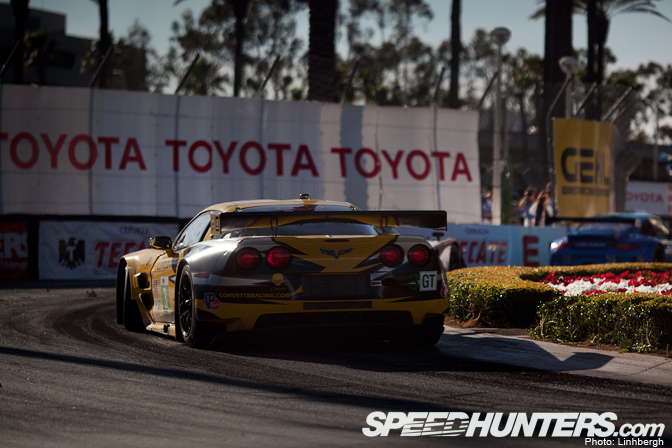
Tom Milner Sr.: Yes, we often forget that we are in the entertainment business. It is virtually impossible to keep all competitors and manufacturers happy. You have to choose. That business model has to be decided on by the sanctioning body and we all need to be flexible. We want good racing, a good show and have to understand that winning every race is, in most cases, not a good show (although it's something we will always strive to do). Tell that to a car manufacturer and they will tell you that they are here to win, nothing else.
Also, racing in the US is different than in Europe or Asia. Same rules, but Sports Car racing in the US is in competition with many other highly developed forms of Motor Sport. They go too far when certain parties have more influence on the sanctioning body than others.
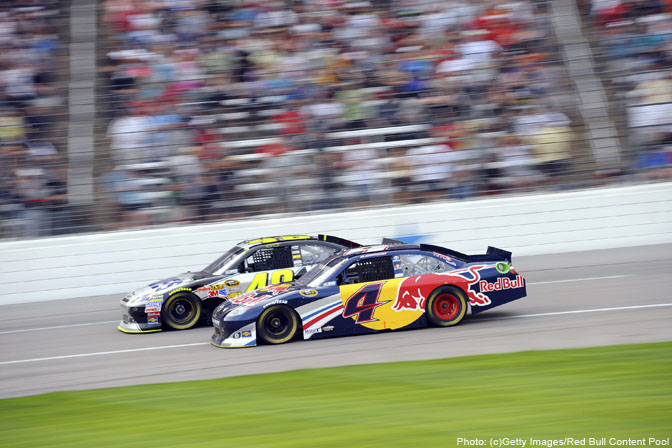
Andy Blackmore: As Tom Sr states, it goes too far when even the informed viewer has trouble understanding the rules as this can only be detrimental to the show. Formula One and to an extent, NASCAR, have been massively successful because they put on a show, a spectacle, something to remember, regardless of whether you're at the track or watching on TV. Both the aforementioned could do a better job, but at least they appreciate it is a show.
One of the toughest areas to police is budget and development. Unless you are running a one-make series, then development will always be something which needs to be controlled. If you are not careful, costs can escalate, get out of control and then teams, sponsors and drivers leave the series. Happens all the time.
I think you have to accept that one team will find a loop-hole or a different interpretation of the rules. Its called progress. You need a mechanism to be able to deal with that quickly, ideally behind closed doors. The blow diffuser debacle in Formula One didn't do anyone any favours. To Joe Public it just looked like spoiled brats arguing in Kindergarten.

Graham Goodwin: There’s always a tipping point but, sadly, you often only know where that point is when you go past it! My personal view is that regulations should not be used to allow the wholly uncompetitive to be competitive. There has to be a place for innovation, strategy and all the other great qualities that have defined our sport.
I’m also unconvinced by arguments that say that there should be an inbuilt advantage for those teams that spend heavily simply as a mechanism to attract them to compete. That advantage should come naturally if they spend the money wisely, those teams should not need regulatory assurance of success, whatever financial muscle they wield.
There is again though a tipping point, take the Le Mans 24 Hours for instance – I believe we'll look back at the past few years as classics, two big factory funded teams going head to head with cars that have broken the mould technologically. But in part that has been overshadowed by the fact that the diesels have consistently had performance advantages not only via the teams funding and the abilities of the teams and drivers, but with help from the regs too. How good could those races have been if there had been 10 or 12 cars with real ability to compete for a podium or a win?
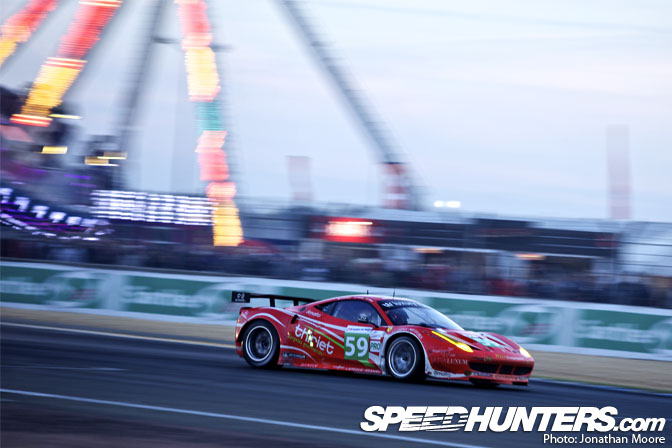
Ricardo Divila: A debatable point. As an engineer, I would like a simple minimum weight, engine capacity (with correct equivalency for diesel, petrol, ethanol, NA, supercharged and turbo engines, and why not, turbines) and minimal dimensional limits to avoid engineering aberrations. All other items would free as the summit of engineering and ingenuity. As an ex-team owner and competitor I realize that this could be a recipe for unlimited spiraling costs, and, long term , not sustainable. So a balanced, not excessive amount of regulation should be accepted.
The problem is that avoiding pressure on rule makers from strong participants (manufacturers and other vested interests) makes this quite difficult. Manufacturers are in the business for a return, not for sport.

What are your thoughts on Spec Vs Performance Balanced Series'? What is the use and purpose of these two methods?
Ricardo Divila: Spec is a formula that theoretically values driver performance by equalizing the cars' performance. The second expected benefit is to ensure the producers have a guaranteed ROI as whatever happens their car will win, in the case of manufacturers.
The downside seen in numerous examples is the multiplicity of single make racing, which doesn't seem to be accepted enthusiastically by the standard spectator and the reduction of grids by the sheer number of championships available. Possibly good for grass-roots racing, as it should bring out a low cost formula for beginners, and enhance the perception of their talents, but the confusion generated when taken to extremes can be a downside.

Tom Milner Sr.: Spec series have their place in motorsports, such as in the Porsche Cup. It is tightly controlled, more for driver development. It turns out to be more of a profit center. Socialized racing, if you like; everyone gets the same thing, or at least, that is what it should be. Sometimes great racing, but who wants to see 20, 30 or 40 'X' brands run around? Only the X brand club member.
If you want to appeal to a broad band of race fans you need as many makes as possible to compete against each other. Since these cars are so different – engines, sizes and so on – you have to use Performance Balancing, if you want to entertain, get people fired up about their favorite car/driver. That is easier said than done and herein lies to problem. It is very hard to do and again everyone, from the manufacturer to the team owner is trying to influence this process and many different ways. Money, threats and sandbagging are a few ways that come to mind.
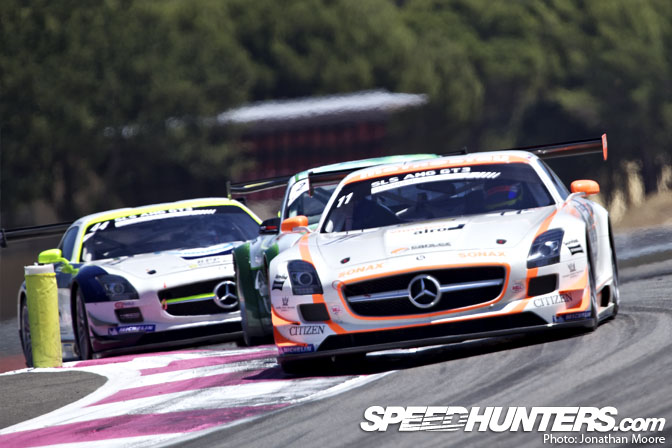
Andy Blackmore: Previously I wasn't a fan of the Performance Balanced approach. My argument used to be: why should car ‘X’ have a rule break if it isn’t as quick, or doesn’t have as much power as car ‘Y? But I have come round to this way of thinking.
The FIA GT3 series and various waivers in the ACO and ALMS Series has shown Performance Balancing can work, it keeps the grid healthy and the racing interesting which is vital, particularly as motor racing is still suffering from the last recession. It's very hard to regulate, as Tom mentions and you will always have one driver or team feeling short changed. Just look at the British Touring Car Championship for evidence. Every year a team lobbies for change because they feel they have been screwed over. First it was diesels, then it was LPG and now it's Turbos. Waivers are dangerous. When a car has 30 odd waivers in order for it to race, it does start to get a bit false, but as a series, you need to accommodate different cars. Money isn’t abound at the moment so not everyone can modify their existing design to meet your exact regs.
I like how the SRO puts a driver in to test all the cars before the season, so they can get a better understanding of how a car performance over a given lap. More series need to do that. I’ll volunteer!

Graham Goodwin: A spec series simply is what it is, you have a standard package, with or without a degree of adjustability, and the rest is down to the quality of team and/or driver. That’s fair but frankly it’s also all too often a rather sterile, homogenized solution, certainly not my cup of tea for motorsport at the highest levels. It’s OK for a competitor- focused one-make series or even for a ‘feeder’ class within a wider field but beyond that its appeal wanes pretty dramatically.
Balance of Performance has emerged as a method of encouraging new blood and more variety into the sport – and in that it’s been successful. The problems come though when the spectre of continuous development appears. We’re now at a position in GT3 racing for instance where huge amounts are being spent to develop the cars, only to then have them reeled back in.
The fastest car can become the slowest with the sweep of a pen and vice versa, a team's investment is negated and you build instability into the process. Take a look at the level of movement of teams into and out of FIA GT3, the turnover rate is terrifying. Look too at the rate of turnover of drivers within a season – almost any season – that’s equally unsustainable and the downward trend in grid numbers proves it. It goes further. Those development costs get passed down the chain and what emerges are partly developed cars running in national motorsport, parts get expensive and reliability suffers, cost therefore grows and, all too soon, you start to lose competitors.
Then there's the additional issue of a clash between sanctioning bodies and their regulations. "Look at the variety in GT3, and the cars are faster than the GT2/GTE cars now" says the SRO camp. And that's true, but only because of a fundamental difference between the philosophies of the GT3 and GTE regs.
In GT3 the principle is that this is the premier class in most races in which the cars compete. There is constant pressure to develop, to find a tenth, and the Balance of Performance struggles to catch up. Inevitably the cars get faster and faster, but the costs get higher and higher too. In GTE the cars are generally the slowest in the field, with LMP cars ahead. There is less incentive to allow the 'junior' class to compete any more directly so the prevailing wind finds the cars more heavily restricted. Cars which are infinitely more technically advanced than their GT3 siblings are actually slower!
My final point came from someone within the Balance of Performance camp, someone tasked with making it work and who has, literally, seen it all. He said "As a theory it's fantastic and in practice it works very, very well too – that is it works well right up to the point where one party decides not to play with a bat that's quite straight – then the whole pack of cards starts to wobble and when everyone cottons on to that opportunity we just can't keep up."
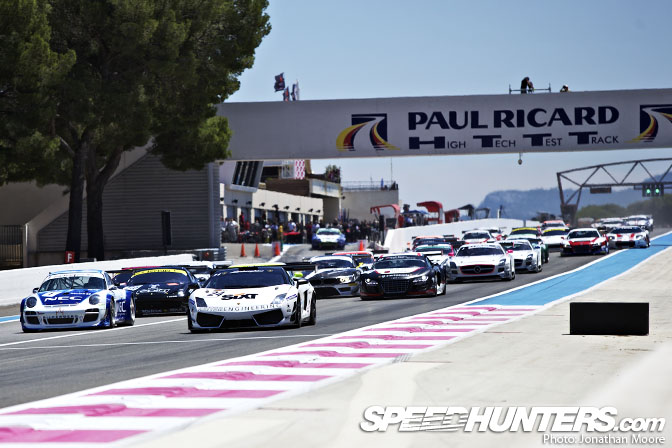
Speedhunters: Discuss the pro and cons of regulating production-based race cars vs pure silhouette machines. Which works better and which is more appealing to race fans?
Tom Milner Sr.: Pure silhouette cars like Prototype cars (LMP1/LMP2) have their place and are the ultimate race car in performance and technology. The hardcore Sports Car fan loves these cars and I think some form of these cars is needed, but at a much reduced cost, which can be regulated through rules. Prototypes really only have a place in racing for manufacturers to show their know-how and technology, as long as you have 3-5 manufacturers involved. Production based cars should be exactly that, not a funny car with a body that looks like the road car. A tube frame car is not a production car, GT3 cars are.
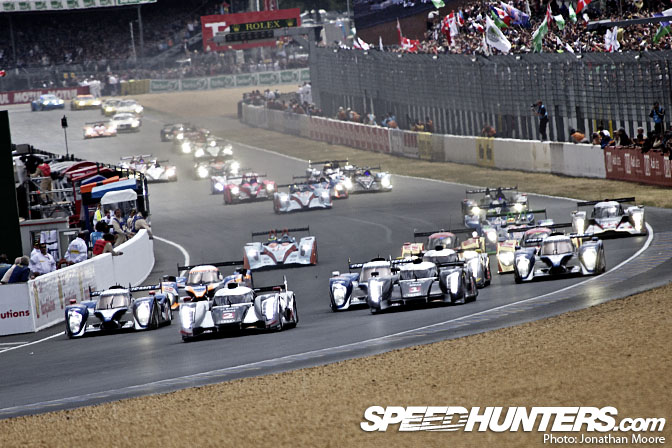
Andy Blackmore: I am a big prototype fan but I’ve really been drawn back to GT racing in recent years, largely due to the competitive racing. GT1 and GT2/E cars are still quite removed from their production road cars, but they still have many connections.
More important is the battle on the track, the GT battle in the ALMS has been great in the last couple of years with Corvette, BMW, Porsche and Ferrari all battling it out. It’s a shame we don’t get this in Prototypes. On the prototype side, when I saw the Porsche 962s, Sauber Mercedes and Jaguar XJRs at Le Mans last year, I got goosebumps. Memory often plays tricks on you, but I have never felt that looking at a BMW M3 GT3….and I own a BMW.
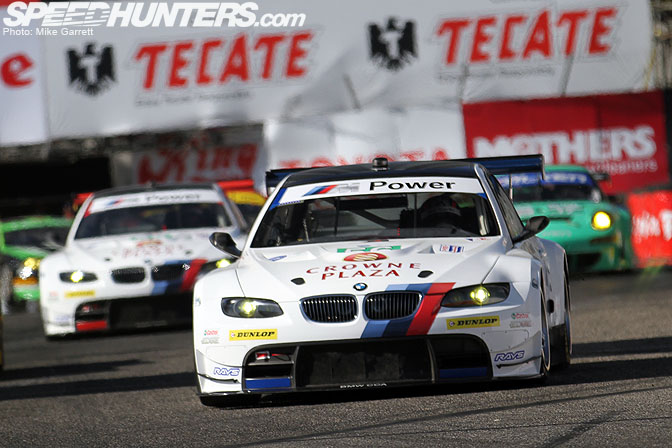
Graham Goodwin: I strongly suspect that most race fans don't really care! The key is entertainment, close racing and variety, and that's a tough cocktail to mix. The basic choice isn't between design philosophies it's between competitive philosophies; do we regulate some semblance of equalisation or do we allow competition to sort it out? Should it be survival of the fittest and fastest? I think most would intellectually support the latter, but if they do they might well have to accept far smaller grids as a result. The inherent risks are massive and if you get a dominant package in any series it would be a brave person to commit the resources to challenge it.
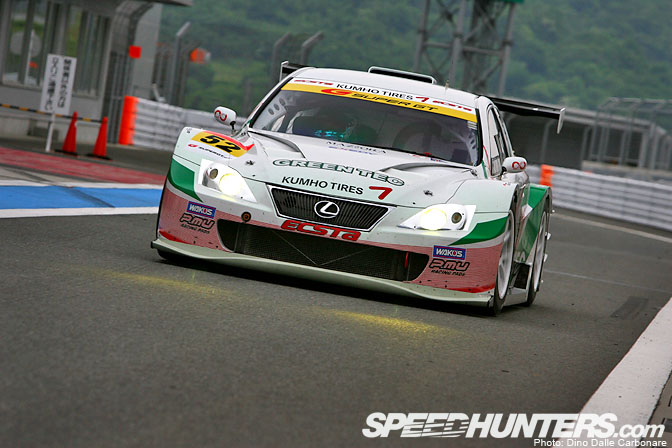
Ricardo Divila: Judging from the Japanese GT series, which are pure silhouette cars, it is a hands down winner for the fans. The same could be said for NASCAR, which also seems to be doing relatively well. Cars which resemble commercially available models create a sense of identification that brings fans. Unfortunately costs can destroy these championships if not carefully balanced.
Apart from which, the involvement of manufacturers is a fickle affair, at the mercy of the accountants. The Japanese GT has been very balanced, and looks like DTM also, but they are both a bit artificial. Again I’m ambivalent about this. It is frustrating to have your superior performance hobbled by weight handicaps or restrictors, but having been party to killing a few championships by being a regular winner, I can see the logic of this. The average spectator does not involve himself or not even understand the arcane juggling to equalize cars, he just sees close racing.
To be concluded soon in Part Three.
Discussion prepared by Mike Garrett, Rod Chong and Charles Kha






GROUP B RETURN!!!!!!!
Destroying nascar? yes absolutely
Destroying other motorsports? nah if anything they are better and more of a level playing field like the tire rule in FD
but who whatches NASCAR anymore anyways
Yes
I found this to be interesting, thanks for the interviews.
wheres my Le Mans rotary
Very very interesting reading. It' s seems quite a double edge sword sometimes with rules and regulations. Inevitably, sanctioning bodies I would imagine, would encourage door to door racing. It creates excitment and most of all entertainment value for the fans. Noone wants to see one particular team running away with the win every time. There's no entertainment value in it.
So generally, a lot of racing fans love spec races.
Since the cars are so close in specification to other cars, the focus generally shifts to the driver and crews setting up the car. At least that is how I saw it when watching NASCAR, Honda Challenge, and the spec Miata series. Weight limits/penalties and power limits come into play.
yeah I think the same...Where's my rotary
Going to far: The Nissan Skyline GT-R's, from R32 to R34 was banned from almost all series of motorsports due to it being an oddly configured car that won too many races (Front Engined, 2.5L I6TT, AWD, 4 seater is not your average supercar set-up). Macau, Bathurst, JGTC (no awd or turbos), most gt3 and gt5 races (no awd, no turbo) for example. It kills technology; these ridiculous stewards and their bias to more notable brands, particularly BMW and Mercedes. I believe the only reason Porsche wasn't banned was because they're German but that's my opinion.
Production Based Race Cars and Pur Siholette Machines: WRC has lost quite a lot of its appeal since its homologation rules were dropped. TimeAttack on the other hand is gaining popularity. Not sound ultra biased or anything but I don't see NASCAR as a good example of production cars vs silhouette cars; reasons of which I will not say due to the immense trolling that I might take part in.
This may be said out of ignorance on my part as it may already be in place, but I've wondered why racing organizations simply don't put a spending cap in place. It has worked well in other sports such as the NBA and NFL in America(apples and oranges I know), but these organizations limit the amount teams can spend on players and that keeps competition close between all the teams in the league. I would like to see a racing organization that allows a given team/manufacturer to run whatever they want within a given formula(whether open wheel, prototype, silhouette, or production based), but can only spend X amount of money on car development and production. It may be a bit simplistic and eventually I'm sure someone would bring a "crooked bat" to the mix which would dominate, but I think it would be fun to watch. My two cents.
what ruins racing to me is not being allowed to really race. drivers cant use certain tactics and techn iques since they arent allowed to, hence schumi and his double blocking, a bs rule imo
Continuing the disussion that wen on at pt.1, I personally think it would be a huge leap forward if they just gave maximum vehicle size and engine performance restriction.

O, and whilst setting a maximum cc's, please make ik either 1300 or 2000cc, would love to hear a screaming rotarypowered F1 car
Stop living in yesteryear, bring back homologation rules with cost caps, bring an emphasis back on technology rather than garagista-common/stock-parts nonsense and stop trying to castrate and slow down motorsport.
as much as it would be an amusing and possibly bankrupting time to see full technological advancement, having these machines beating the track at an ever increasing pace would be pure petrol head heaven! however, Im of the opinion that not only are rules and regulations there to "keep it fair" they are there to keep the drivers alive. there is more than one reason group B got banned.
YES! Wayyyy too much rules and regulation... What happen to the days where you just make horrendous cars that makes pure brute power! Insanely hard to drive cars that put the drivers at risk. The lively crowd of people surrounding the track with no care if the cars are inches from them.
If cigarette kills and has a warning label only, so should racing.
Now to wrap our three-part discussion on rules and regulations in motorsport as Tom Milner Sr., Andy Blackmore, Graham Goodwin, and Ricardo Divila tackle the topics of the costs of racing, the idea of GT3 in North America, the fan's perspective, and